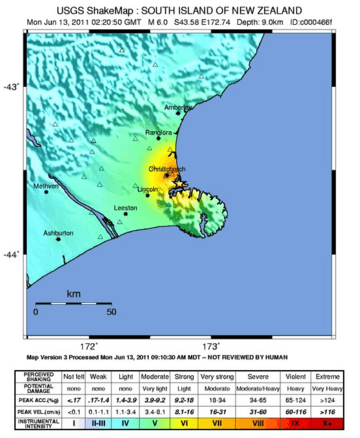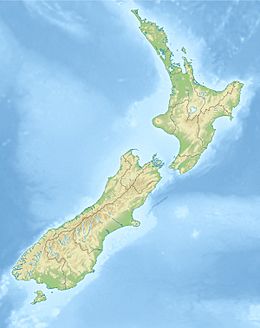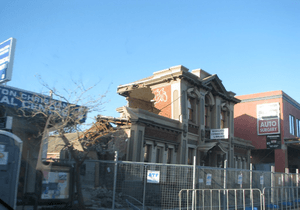June 2011 Christchurch earthquake facts for kids

Map showing the epicentre of the earthquake
|
|
| UTC time | 2011-06-13 02:20:50 |
|---|---|
| ISC event | 16591901 |
| USGS-ANSS | ComCat |
| Local date | 13 June 2011 |
| Local time | 14:20 |
| Magnitude | 6.3 ML |
| Depth | 6 km (4 mi) |
| Epicenter | 43°34′S 172°44′E / 43.56°S 172.74°E |
| Type | Strike-slip |
| Areas affected | New Zealand |
| Total damage | Building collapse, power outages, broken water pipes, soil liquefaction, rockfall |
| Max. intensity | VIII - Destructive |
| Peak acceleration | 0.78g (city); 2.13g (epicentre) |
| Tsunami | No |
| Casualties | 1 dead, 46 injured (2 critically) |
The June 2011 Christchurch earthquake was a strong earthquake that hit on June 13, 2011. It happened at 2:20 PM New Zealand time (2:20 UTC). The earthquake had a magnitude of 6.3 ML. This means it was a powerful quake.
The earthquake started about 6 kilometers (3.8 miles) deep in the Earth. Its epicenter was only about 10 kilometers (6 miles) from Christchurch, a city in New Zealand. Christchurch had already been badly damaged by another big earthquake in February 2011.
Before the main June earthquake, there was a smaller tremor. This tremor had a magnitude of 5.9 ML. It started a bit deeper, at 8.9 kilometers (5.5 miles). The United States Geological Survey measured the main earthquake as a 6.0 Mw at about 9 kilometers (5.6 miles) deep.
The shaking from the June earthquake was very strong. It reached level VIII on the Mercalli intensity scale. This scale tells us how much people feel the shaking and how much damage it causes. The quake destroyed some buildings and caused more damage to many structures that were already weak from earlier earthquakes. For example, the damaged tower of the historic Lyttelton Timeball Station fell down. The extra damage from this quake added about NZ$6 billion (US$4.8 billion) to the cost of rebuilding Christchurch.
Contents
What Happened: Damage and Injuries
This earthquake and its smaller tremor happened in the afternoon. Many buildings in Christchurch were already unstable from earlier quakes. About 400,000 people were directly affected. Most of them felt at least strong shaking.
Hospitals reported at least 46 injuries. Some people were hit by falling debris. Two people were seriously hurt. In the city center, two workers were rescued from a collapsed church and taken to the hospital. The next morning, officials confirmed that an elderly man had died. He fell and was knocked out in a rest home when the earthquake struck. Many more injuries were avoided because people had already left buildings after the first, weaker tremor.
After the earthquake, many phone lines stopped working. About 54,000 homes lost power. Also, at least 70 underground power cables were damaged, which added to the outages. The strong shaking broke local water pipes. This caused widespread flooding on several streets.
Officials also closed bridges in the area to be safe. One bridge was reported to have collapsed because of the strong ground movement. Days after the main quake, there were still many smaller aftershocks.
Earthquake Effects on the Ground
The strong ground shaking caused other problems too. There were gas leaks and widespread soil liquefaction. This is when the ground turns soft and mushy, like quicksand, because of the shaking. Because of this, sand boils appeared on asphalt roads. These are mounds of sand and water that bubble up from the ground. Some cars were knocked over, and one even sank.
In the hill suburbs of Sumner and Redcliffs, falling boulders from the hillsides damaged several houses. After the quake, much of Christchurch lost water pressure. Residents were told to save water. In some parts of the Heathcote Valley, springs appeared. This happened because the water level underground suddenly rose, flooding some properties.
The exact cost of the damage was not clear right away. However, the earthquake caused more damage to many buildings in Christchurch. About half of the buildings in the city center were already damaged or destroyed by previous strong earthquakes. Assessments showed that over 100 more buildings in the area were too damaged to be repaired. Even though the first tremor was not as strong, it caused several two-story buildings to collapse at a road intersection. Many hospitals and care homes in Christchurch lost important services. Some also reported a lot of damage to their buildings.
Images for kids
-
USGS shake map
See also
 In Spanish: Terremoto de Christchurch de junio de 2011 para niños
In Spanish: Terremoto de Christchurch de junio de 2011 para niños
 | Selma Burke |
 | Pauline Powell Burns |
 | Frederick J. Brown |
 | Robert Blackburn |






